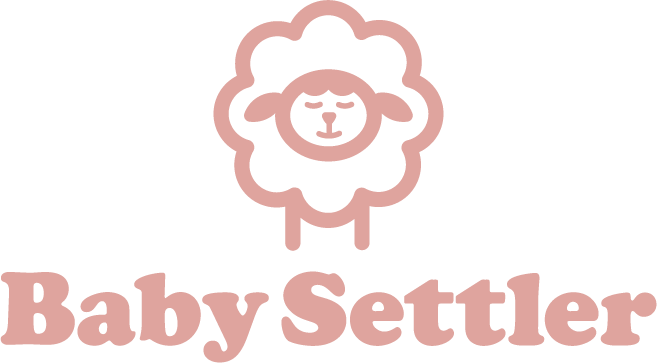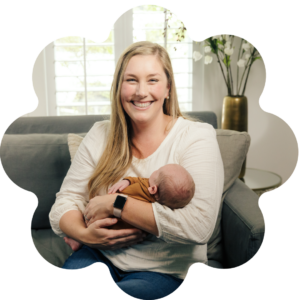As a lactation consultant, I get asked all the time from parents and on Instagram and social media: What exactly is a newborn? What age constitutes a newborn? What are the most important tips for newborn care? A newborn is a baby that is zero to 28 days old – it’s that first month of life. Then, an infant is basically months two to 12. After they’ve had their first birthday, they’re a toddler. On social media, you’ll see lots of advice about certain things that are for newborns or babies or toddlers or whatever. So, knowing what age is being referred to is really important so that you can make the right choices for your little one.
There are also some specific things that we worry about with newborns. Let’s cover these topics, namely: Feedings, wake windows, sleep, and newborn health symptoms.

Newborn Feeding Tips
A newborn in the first month of life should eat at least eight times in 24 hours. This is because the average newborn is somewhere between five to ten pounds. Based on the size of their stomach, they need to feed at least eight times in a day to be able to get the volume that they need to grow. We want them to grow at a weight rate of about four to seven ounces per week. Whether you’re breastfeeding or bottle-feeding, your newborn needs to be eating at least eight times during their first month of life.
For bottle feeding, I always recommend Dr. Brows bottles for their venting system which makes paced bottle feeding (a technique that comes close to the experience of breastfeeding) simple. “Paced feeding helps your baby listen to her natural hunger and fullness cues instead of encouraging her to drink a certain number of ounces just because that’s what’s in the bottle,” tells What To Expect.
I know that breastfeeding is not the right route to take for many mamas out there, so for formula opt for one that is proven to facilitate weight gain, supports immune and gut health, and is easy on baby’s tummies. By Heart ticks these boxes and their formula is made using organic, grass-fed whole milk and is created to be close to breast milk.
Newborn Growth Milestones
Your little one goes through some pretty amazing developmental milestones in their first month of life, which are also signs of a healthy newborn!
In the first week of their life, they can already know you via your voice and this is the beginning of learning language. Parents explains, “… talking to them is an expression of love and will eventually lay the foundations for language development in their brain.”
During the first month, your newborn will also begin focusing on things with their eyes! In week 2, you can move your head from side to side and notice how your baby’s eyes follow you.
March Of Dimes explains that newborns also begin to prefer human faces and high contrast patterns over other shapes. They’ll also hear super well and make jerky, quivering arm movements.

Newborn Baby Wake Window Insights
What in the world do you do during newborn wake windows? A wake time for a newborn is really only going to be about 20 to 30 minutes long. They’re not going to be able to stay awake much longer than that. If your newborn is staying awake longer than that, then a lot of times they’re getting overstimulated and it’s potentially impacting feeding, and it’s definitely impacting sleep.
Baby overstimulation signs include:
- Clenched fists
- Fussiness
- Not wanting to nurse
- Resisting being held
Remember, your newborn doesn’t have coping mechanisms when they’re overwhelmed with everything that’s happening around them. “When you start to notice that your baby is overstimulated, take them to a quiet place where they can calm down. If you are at home, take them to their room and dim the lights,” suggests Verywell Family.
During a wake window, your newborn could be sucking on a pacifier or just looking around for the first five to 15 minutes. Then, you start a feed halfway into the wake window; a lot of times that will cause them to have a sleepy feed and not take their full volume. To encourage them to feed more, you can stroke their hands and feet when they start falling asleep. Medela adds, “Sitting your baby up and giving them a gentle back rub can also help to wake them up and it gives them the opportunity to expel any trapped wind that they may have. If that fails, changing your baby’s nappy mid-feed can rouse them enough to feed some more.”
Make sure you subscribe for more Baby Settler tips about feeding your newborn.
Sleep Patterns In Newborns
You need to have realistic expectations for how long your newborn should be sleeping. They’re probably not going to sleep for more than a one, four, maybe five-hour stretch in a 24-hour window. Why? Because they have to get in those eight feeds.
A newborn is not going to be able to self-soothe. The key to getting a newborn to get really good pockets of sleep in between feedings is preventing overstimulation. Hit reset, feed them, and get them to sleep when they’re overstimulated. Then, start feeding at the beginning of the next wake window.
Also, they’re probably not going to be falling asleep on their own. When it comes to how to soothe a newborn, you can practice the five S’s.

The five S’s for newborns are:
- Swinging can really calm a fussy baby. You can slowly rock your little one in your arms, but if they’re crying a lot you can pick up the pace. Never shake your baby as this can lead to brain damage.
- Shushing can help transport your baby back to the safe space of the womb. One study done in the 90s found that 80% of babies in the study who listened to white noise fell asleep within five minutes.
- Side-lying position for calming, not for sleep. You can lay your baby across your forearm with your hand supporting their head, and then place them on their back for sleep.
- Sucking on a pacifier can relax your newborn for sleep, as Mayo Clinic tells, “A pacifier might soothe a fussy baby. Some babies are happiest when they’re sucking on something.”
- Swaddling a newborn is a fantastic way to mimic the womb environment, which then helps to calm them. “In addition, swaddling reduces the likelihood of babies waking themselves up with their Moro reflex — startling at sudden sounds or movement and flailing their little arms,” adds Healthline. Also, it’s important to stop swaddling your baby when they begin to show signs of rolling over.
Using these methods to help your baby transition to that deep sleep is going to be super helpful.
Newborn care in the first month of life is really all about feed, wake, sleep, and feed upon waking. Of course, there are a few other signs to be aware of for your baby’s health:
Newborn Health Signs
If your newborn has a temperature greater than 100.4, you need to contact your pediatric provider. “Always use a digital thermometer to check your child’s temperature. Never use a mercury thermometer,” advises Stanford Health. Sometimes newborns don’t really appear sick. Their body temperature might be one of the only ways that they’re telling you that they’re ill. They also can be really, really super sleepy. A baby that is sick is going to go into a kind of hibernation mode. If your baby is not having good periods of wake windows between feeds, and not waking up and taking feeds in that first month of life, they should definitely be checked out.

Projectile vomiting means vomit that goes across the room and hits the wall. This is always a concern.
You want to make sure that your newborn is having plenty of output. They should be having at least six to seven really wet diapers every day after the first week.
A high-pitched cry is also concerning; you will begin to learn the different types of cries that your baby has. “Very high-pitched crying, up to three times higher than a normal infant cry, that persists, or in some cases very low-pitched crying that persists, can be associated with severe or chronic illness. This type of crying is markedly dissimilar from any normal infant cries,” explains About Kids Health.
Additionally, the soft spot on their head should not be sunken in.
The above are all newborn health concerns that would have you reach out to your pediatric provider.
Navigating first-month baby challenges can be made simpler when you’re prepared. Getting to know your newborn feeding schedule and sleep patterns, and learning more about recognizing baby cries can go a long way to creating a more successful first month with your newborn.




